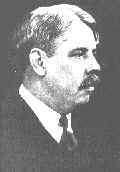 Meet Edward Thorndike, a follower of John Dewey, of whom I wrote a couple days ago.
Meet Edward Thorndike, a follower of John Dewey, of whom I wrote a couple days ago.
Thorndike also had a major influence on American education. His contribution was to take behaviorist psychology, which looked upon man as simply a higher form of animal, and apply it to his educational philosophy.
He concluded that because man was just an animal, and not a unique creation made in the image of God, he should be treated as an animal. Rats were put through mazes; Pavlov conditioned dogs to respond to an external stimulus. Thorndike said that insight should be used on people as well. He came up with an approach we call “conditioning through stimulus-response techniques.”
While it is true that man can be conditioned to a certain degree, he is not an animal. Rather, he has a moral sense and the ability to grasp the difference between right and wrong. Man is not a creature whose actions will be dictated solely by his environment.
Interestingly, it was Thorndike who introduced new methods of testing based on his philosophy—true/false and multiple-choice exams. So I tell my students I refuse to treat them like dumb animals by giving them such exams; instead, I treat them as free moral agents made in God’s image. They should be happy to be given the opportunity to think and write.


